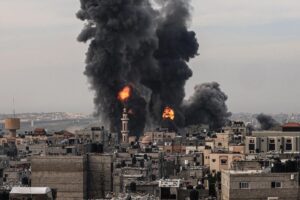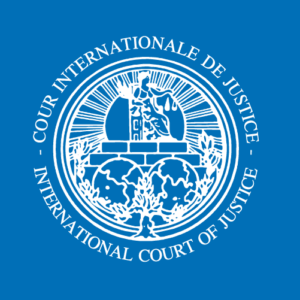As the world remains transfixed by daily news reports about the ongoing conflict involving Israel and Palestine, playing out largely in Gaza, some observers have directed attention to how events are being verbally described in the English-language press. It would appear that a war of actions is being bolstered by a war of words. Indeed, even naming the conflict itself – the Israel/Hamas war? the Israel/Palestine war? Israel’s war on Gaza? – poses a challenge and suggests that a position has been taken.
Boston University linguistics professor Elizabeth Coppock recently described the strategic use of language in the conflict. “Language is a secondary arena for the conflict in the sense that language can be used to advance or thwart agendas in the conflict over how the various actors should be viewed,” she wrote, furthermore noting that “dehumanizing language is being used by military leadership on both sides.” Coppock reminds us of the use of such verbal practices by the Nazi regime in its genocidal targeting of Jews during WWII, and by the Hutus in reference to Tutsis during the Rwandan Genocide. She explains how the choice of terms – “kill” vs. “murder” for instance – “presupposes” a certain perspective, which may subsequently lead to and serve as a justification of military actions. “Through the presupposition of practices, language can be used not only to demonize and dehumanize, but also lay the groundwork for actions that reflect that practice.”
Journalist Chris McGreal has also written about the use of dehumanizing language in the ongoing war, considering that Israel has, in particular, inflamed the conflict through its choice of words, which he considers “genocidal.” At the same time, McGreal compares Hamas’ actions and later description of their October 7 massacre to another time and place: “The shocking ways in which Hamas butchered Israeli civilians, including small children, and then celebrated the slaughter reminded me of reporting the Rwandan genocide three decades ago.”
Ammara Maqsood and Amandas Ong note a different but equally impactful use of language in the Israel/Hamas conflict, the tendency to downplay the seriousness of military actions by couching them in terms better suited to a sporting event, where outside nations choose a “team” who might have “power players.” They contend that the Israeli Defense Force’s use of “hyper-realistic simulators” to train its soldiers in how to respond to threats from the Palestinian population serves to reinforce the sense of war as a game. At the same time, the circulation of phrases that obliquely refer to the killing of Palestinians – such as the “remove kebab” meme – makes violence more acceptable. “The social reality created through this language game is one that is perverse and topsy-turvy,” they write. “In the language game played by powerful perpetrators of mass violence, the victims aren’t considered people, and their pain doesn’t count.”
Allegations of downplaying the seriousness of violence, this time the acts perpetrated against Israelis, have also been directed at some in the United States. In The Atlantic, writer Gal Beckerman warns against language that “erases reality,” referencing an open letter signed by a number of US progressives that appeared to do just that. Beckerman responds to their description of what happened on October 7 with the phrase “Hamas militants broke out of Gaza.” He writes, “To describe what Hamas did as breaking out of Gaza, as if what happened took place in a spontaneous moment of liberation, is to hide the fact that this was by all accounts a sophisticated and highly planned assault. Hamas didn’t break out of Gaza. Three thousand militants with intent and agency murdered as many civilians as they possibly could with the goal of drawing Israel into a brutal conflict, which is, sadly, precisely what is now taking place.”
 Image Caption: Said Khatib/Agence France-Presse — Getty Images
Image Caption: Said Khatib/Agence France-Presse — Getty Images
The use of language in “manufacturing consent” for political domination has been explored by Isabella Hammad and Sahar Huneidi in The Nation. In particular, they describe how persons in the US have been punished for their public support of the Gazan population, their calls for a ceasefire, or their view that speech around the conflict on US university campuses may need to be contextualized instead of vilified without question. They write that “despite the Jewish voices loudly resisting the conflation of Jewishness with Zionism, the accusation of antisemitism is now the lexical weapon of choice leveled at Palestinians and those who speak in support of Palestinian rights, including the right to life.”
The strategic use of language was not missing from the oral arguments presented in January 2024 by both South Africa and Israel before the International Court of Justice (ICJ). In late December, South Africa brought an application against Israel, alleging that it is perpetrating genocide against the population of Gaza. South Africa also asked the Court to issue provisional measures to stop the fighting, pending a ruling on the merits of the case. On 11 January 2024, speaking for South Africa, Ambassador Vusi Madonsela noted that “South Africa has recognized the ongoing nakba of the Palestinian people through Israel’s colonization since 1948…” (see the video at 16:19). He chose to use the Arabic term, meaning “catastrophe,” used by Palestinians to describe their displacement from the territory now known as Israel. The following day, Legal Advisor to the Israeli Ministry of Foreign Affairs Tal Becker stated the following: “[South Africa’s] Application and Request should be dismissed for what they are – a libel, designed to deny Israel the right to defend itself according to the law from the unprecedented terrorist onslaught it continues to face…” (see the video at 33.39). His use of this term evokes the charge levied at so many critics of Israel and Israeli policy – that their criticism constitutes “blood libel,” a reference to “the centuries-old antisemitic trope that Jews kill non-Jewish babies to drink their blood, ” explains The New York Times. (The ICJ subsequently issued provisional measures, indicating that Israel must take action to prevent genocidal violence by its armed forces; “prevent and punish” the incitement to genocide; and insure that humanitarian aid to Gaza is increased.)

As Tanner Stening of Northeastern Global News has rightly noted, “the public discourse about the Israel-Hamas war presents a linguistic minefield riddled with terms, slogans and international legalese that makes discussing the conflict incredibly nuanced.” But while the weaponization of language during such a fraught conflict is perhaps inevitable, there may be ways to mitigate the escalation of emotion that certain words generate. Gal Beckerman writes that “[w]ords have the power to both grant humanity and take it away—so we should use them carefully, especially now.” This view is echoed by Los Angeles Times journalist Page Fortna, who exhorts the public to take seriously the impact of words in the current situation. “Many of the words used to describe this conflict (terrorism, war crimes, apartheid, genocide) are deeply loaded. Some argue they should be avoided altogether. But the antidote to their weaponization is not to avoid them but to use them carefully, accurately and consistently. We need to call terrorism and war crimes out by name, whichever side uses them, and whatever we think of the legitimacy of the causes in whose name they are used. Our humanity depends on it. So does any hope for understanding this conflict and, perhaps, ending it.”
Interested in the topic of language, violence and war more generally? Additional resources are listed below.
Ayyad, Ahmad. 2023. Contested naming practices in the Palestinian–Israeli conflict: a translation perspective. Translation Studies, DOI: 10.1080/14781700.2023.2258133.
McIntosh, Janet. 2021. Language and the Military: Necropolitical Legitimation, Embodied Semiotics, and Ineffable Suffering. Annual Review of Anthropology, Vol. 50, pp. 241-258. Open access version available here.
Lukin, Annabelle. 2021. How International Law War Makes Violence Legal: A Case Study of the International Criminal Court. Spotlight on Language, Culture and Justice, March 2021.
Special issue, Journal of International Humanitarian Legal Studies, Volume 14 (2023). Symposium: Law, Language and War. See the issue’s table of contents here.
